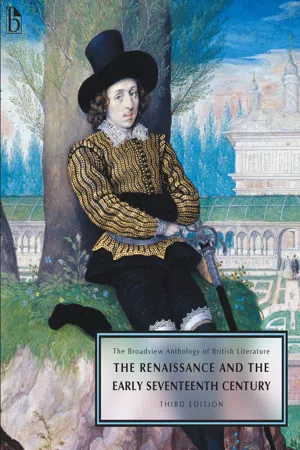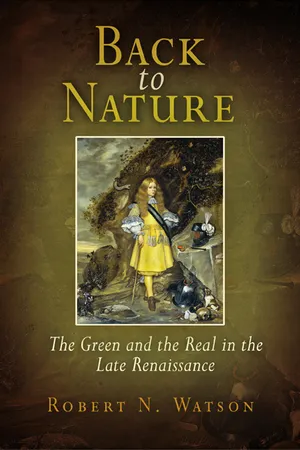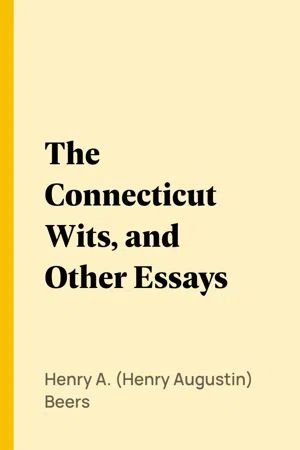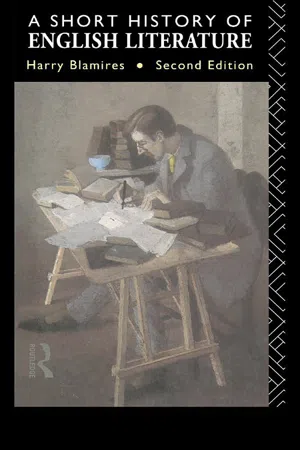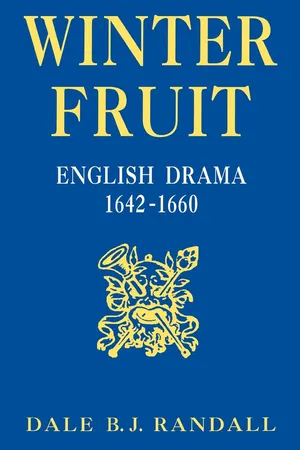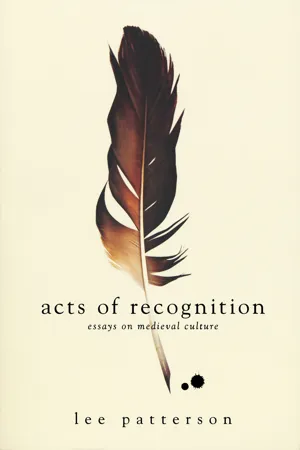Literature
Cavalier Poets
The Cavalier Poets were a group of 17th-century English poets who were known for their elegant and sophisticated style, as well as their celebration of love, beauty, and pleasure. They often wrote about courtly life, chivalry, and the pleasures of the present moment, and their poetry was characterized by its wit, lyricism, and polished language.
Written by Perlego with AI-assistance
Related key terms
1 of 5
6 Key excerpts on "Cavalier Poets"
- Joseph Black, Leonard Conolly, Kate Flint, Isobel Grundy, Wendy Lee, Don LePan, Roy Liuzza, Jerome J. McGann, Anne Lake Prescott, Barry V. Qualls, Jason Rudy, Claire Waters(Authors)
- 2016(Publication Date)
- Broadview Press(Publisher)
Royalist and “Cavalier” Poetry A “cavalier” was originally a mounted soldier or knight, but by the late sixteenth century the term also implied a roistering gallant. When the word was first applied to the gentlemen who fought on behalf of King Charles during the civil wars of the 1640s, it was meant as an insult. But as is often the case with such labels, it was eventually embraced by those to whom it was reproachfully applied. The “Cavalier Poets” are writers associated with the Royalist cause; “cavalier poetry” is above all a political category. But not all Cavalier Poets knew they were cavaliers: Thomas Carew and Sir John Suckling died before the wars began (and so before Royalist cavaliers even existed). A great deal of “cavalier poetry” is in fact court poetry of the 1620s and 1630s, poetry that was subsequently packaged in the 1640s as expressing “Royalist” values. That is, the cavalier mode is in many ways retrospective and nostalgic: it celebrates beauty, love, nature, sensuality, drinking, good fellowship, honor and social life, and it does so in poetry famous for its urbanity, elegance, and often ironic ease. Of course, once the wars got underway, many Royalist poets also wrote explicitly political verse that commented on the conflict. Cavalier Poets were all deeply influenced by the wit of John Donne and the craftsmanship of Ben Jonson; at its best, cavalier poetry seems the offspring of a poetic marriage between the work of these two great models. For other Royalist or “cavalier” poetry, see the selections from Robert Herrick and Katherine Philips. zzz T HOMAS C AREW 1 The Spring N ow that the winter’s gone, the earth hath lost Her snow-white robes, and now no more the frost Candies the grass, or casts an icy cream Upon the silver lake or crystal stream; But the warm sun thaws the benumbed earth, 5 And makes it tender; gives a sacred birth To the dead swallow; wakes in hollow tree The drowsy cuckoo, and the humble-bee.- eBook - PDF
Back to Nature
The Green and the Real in the Late Renaissance
- Robert Watson(Author)
- 2013(Publication Date)
- University of Pennsylvania Press(Publisher)
That the Cavalier Poets were virtually all Royalists may seem too circular an argument to be probative, since the Cavaliers were partly identified by their political affiliations (as in Johnson’s definition of the term). Still, those most identified with the poetic mode were also those most active in the royal military cause: Lovelace (twice imprisoned by the Parliamentarians), Suckling (“a royal-ist martyr”), 72 Denham (affiliated with the kings’ parties at every stage), Waller (whose costly if quirky role in the king’s cause is reflected in his verse by a “sub-ordination of independent thought and fancy to the severest artificial laws of style”), 73 and Herrick (whose 1648 Hesperides repeatedly echoes and evokes high Laudian formulas and rituals, with a touch of classical paganism). 74 Other markedly Cavalier-style lyricists such as Richard Corbett clearly would have fol-lowed the same warpaths had they lived into the 1640 s. 75 By the late 1640 s, however, the downward path of their army led the Cava-liers into new poetic territory. As George Sandys notes in his translation of the Metamorphoses , “The wit that misery begets is great: / Great sorrow addes a quicknesse to conceit” ( 6 . 617 – 18 ). When Richard Lovelace’s Royalist position started bringing him serious trouble instead of casual pleasure, he does, in a Cavalier way, something very Metaphysical: suggesting that the literary imagi-nation can reconceive a miserable reality as a kind of happiness. This is most obvious in the prison poems. The conversion of a sense of boundedness into a sense of protected private space for pleasure, so persistent in Donne, becomes the Royalist theme throughout the 1640 s, where the tavern, the country re-treat, the garden, the secret, even the cell become havens—associated, for some, with the place where a priest would be harbored and administer the wine for blood. Assertions of simple nature become acts of fantastic defiance, or at least denial. - eBook - ePub
- Henry A. (Henry Augustin) Beers(Author)
- 2016(Publication Date)
- Perlego(Publisher)
The singing and fighting Cavalier was most nobly represented by James Graham, Marquis of Montrose, a hero of romance and a great partisan leader. With a handful of wild Irish and West Highland clansmen,—Gordons, Camerons, McDonalds,—with no artillery, no commissariat, and hardly any cavalry, Montrose defeated the armies of the Covenant, took the towns of Aberdeen, Dundee, Glasgow, and Edinburgh, and in one brief and brilliant campaign, reconquered Scotland for the King. Nothing more romantic in the history of the Civil War than Montrose’s descent upon Clan Campbell at Inverlochy, rushing down from Ben Nevis in the early morning fogs upon the shores of wild Loch Eil. You may read of this exploit in Walter Scott’s “Legend of Montrose,” as you may read of the great Marquis’s death in Aytoun’s ballad, “The Execution of Montrose.” For his success was short. He could not hold his wild army together: with the coming of harvest the clansmen dispersed to the glens and hills. Montrose escaped to Holland and, after the death of the King, venturing once more into the Highlands, with a commission from Charles II, he was defeated, taken prisoner, sentenced to death in Edinburgh, hanged, drawn, and quartered. His head was fixed on an iron spike on the pinnacle of the tollbooth; one hand set over the gate of Perth and one over the gate of Stirling; one leg over the gate of Aberdeen, the other over the gate of Glasgow. Montrose wrote only a handful of poems, rough, soldierly pieces,—one on the night before his execution, one on learning, at the Hague, of the King’s death. But by far the best and the best known of these are the famous lines of which I will quote a part. You will notice that, under the form of a lover addressing his mistress, it is really the King speaking to his kingdom. You will notice also the fine Celtic boastfulness of the strain and the high-hearted courage of its most familiar passage—the gambler’s courage who stakes his all on a single throw.My dear and only love, I pray that little world of thee Be governed by no other sway than purest monarchy; For if confusion have a part, which virtuous souls abhor, I’ll hold a synod in my heart and never love thee more. As Alexander I will reign and I will reign alone; My thoughts did ever more disdain a rival on my throne. He either fears his fate too much, or his deserts are small, Who dares not put it to the touch, to gain or lose it all, But if no faithless action stain thy love and constant word, I’ll make thee glorious by my pen and famous by my sword: I’ll serve thee in such noble ways was never heard before: I’ll crown and deck thee all with bays and love thee more and more.I have dwelt almost exclusively upon the military and political aspect of Cavalier verse. A wider view would include the miscellaneous poetry, and especially the love poetry of Carew, Herrick, Waller, Haberton, Lovelace, Suckling, Cowley, and others, who, if not, strictly speaking, Cavaliers, were royalists. For the only poets in England who took the Parliament’s side were Milton, George Wither, and Andrew Marvell. Of those I have named, some had much to do with public affairs and others had little. Thomas Carew, the court poet, died before the outbreak of the Civil War. Herrick was a country minister in Devonshire, who was deprived of his parish by Parliament and spent the interregnum in London. Edmund Waller, a member of the House of Commons, intrigued for the king and came near losing his head; but, being a cousin of Oliver Cromwell and very rich, was let off with a heavy fine and went to France. Sir John Suckling, a very brilliant and dissipated court favorite, a very typical Cavalier, had raised a troop of horse for the King in the Bishops’ War: had conspired against Parliament, fled to the continent, and died at Paris by his own hand. Colonel Richard Lovelace fought in the royal armies, was twice imprisoned, spent all his large fortune in the cause and hung about London in great poverty, dying shortly before the Restoration. Cowley was a Cambridge scholar who lost his fellowship and went to France with the exiled court: became secretary to the queen, Henrietta Maria, and carried on correspondence in cipher between her and the captive King. - Available until 25 Jan |Learn more
- Harry Blamires(Author)
- 2013(Publication Date)
- Routledge(Publisher)
Sometimes (as in ‘Bid me to live, and I will live/Thy Protestant to be’) fine feelings are unpretentiously embodied in shaped and fluent stanzas that defy criticism; and sensuous experience of touch or sight may be neatly recaptured in images of unpremeditated felicity. The voluptuous quality of silk is subtly verbalized in: When as in silks my Julia goes, Why, then (me thinks) how sweetly flowes That liquefaction of her clothes. Herrick wrote much bad and mediocre verse, and he could be guilty of indecent bad taste, but an idealized world of great charm is freshly and frankly reconstituted in his best lyrics. Faultlessly patterned stanzas shape it, and it is sprinkled with the lore of a well-stocked, if wanton, mind. In reading Herrick we note a decisive shift from the centre of poetic interest evident in the work of Donne and his school. We leave the poets who struggle with themselves, struggle with love and struggle with words, for a poet who comments with an air of facility. The group of poets known as the ‘Cavalier Poets’ are akin to Herrick in this respect. Poetry does not seem to be an essential business of their lives. This does not merely mean that they were not professional poets: neither were Donne and Herbert. But poetry seemed to matter to Donne and Herbert precisely because what they were using it for mattered enormously. Much of the poetry of the Cavalier Poets is, we feel, so peripheral to their true inner and active lives as to represent a fashionable accomplishment rather than an art. Thomas Carew (?1594–1640), in ‘Disdain returned’, explains to Celia why, having learned her arts, he will never return to her. Wordsworth spoke of poetry as ‘emotion recollected in tranquillity’, but this is emotion dissipated in tranquillity. So is the poem ‘Ingratefull beauty threatned’. ‘Let fools thy mystique forms adore’, says the poet, explaining that his verse created Celia’s image and he himself cannot be taken in by it - eBook - PDF
Winter Fruit
English Drama, 1642-1660
- Dale B.J. Randall(Author)
- 2014(Publication Date)
- The University Press of Kentucky(Publisher)
a C O M E D I E S 2 7 7 sharp and quite sudden increase in the amount of comic poetry (21). As luck and etymology would have it, our thoughts about what was happening in dramatic writing may be aided by the realization that a Greek synonym for satirize is komoidein, literally to comedize (Levin 195). Yet the larger wonder here—indeed, one of the wonders of this entire study—is that so many writers continued to find reasons to comedize after the playhouses were ordered closed. As we watch comedy and satire moving toward the near-synonymity that they often achieve in the Restoration, we also encounter many signs of what may be called The Cavalier Phenomenon. Alfred Harbage, one recalls, thought the adjective cavaliers sufficiently broad umbrella to cover his pioneering work on midcentury plays. A major aim of the present study has been to convey instead a sense of the unruly multeity of the period, but let us here make sure that cavalierity receives its due as an element in the plays—including the comedies—of the period. In 1650, according to Marchamont Nedham (at that time a hired pen for Parliament), the several parties claiming an interest in England were the parliamentarians, royalists, Scots, Presbyterians, and Levellers (51). In other words, a serious oppositional listing of parties of the day could afford to omit the term cavaliers. Nedham's nearest word here is obviously royalists. Almost as obviously, however, while royalist designates commit-ment to the royal cause, it cannot do much more, whereas cavalier has at least the potential of adding to royalist the residual implications of soldiery and, more specifically, connotations of being mounted on horseback, hence being superior, literally and figuratively. Edward Symmons wrote that a complete cavalier is the onely Reserve of English Gentility and ancient valour (Boyce 127). - eBook - PDF
Acts of Recognition
Essays on Medieval Culture
- Lee Patterson(Author)
- 2009(Publication Date)
- University of Notre Dame Press(Publisher)
34 A great many courtiers did in fact write poetry: we have the names and some of the poems of over a dozen noble makers from late medieval En- gland, as well as the rather bizarre fact that Richard II wanted his epitaph to compare him to Homer. 35 Indeed, one of the tasks of the professional poet (if the title be admitted at all) was to collaborate with the patron in the production of the courtly text. Froissart’s Prison amoureuse, for in- stance, records the way in which the poet instructed his patron, Wenceslas of Brabant, in the art of making, and both this text and the later Méli- ador contain poems by both authors. 36 The same is true of Machaut’s Fon- teinne amoureuse, which describes the departure of Jean, duc de Berri, into exile and incorporates several of the Duc’s laments. Indeed, it is not im- possible that in Chaucer’s Book of the Duchess the rather inept lyrics as- cribed to the grieving Black Knight were really written by John of Gaunt, to whom the poem was dedicated. This expansion of literariness to include the court as a whole also helps to account for a pronounced generic shift in the literary system of fourteenth-century England. Romances and histories, almost entirely in prose, continued to be copied and read, as library lists and manuscript survivals demonstrate. But the literature of fashion produced within the court — excluding works of instruction — was almost exclusively lyric. This category includes not only lyrics per se—the many “compleyntis, baladis, roundelis, virelais” that Lydgate ascribed to Chaucer and that must have been written by other courtly versifiers in the hundreds — but also the new genre of the dits amoureux produced by Machaut and Frois- sart. 37 For all their apparently narrative form, these works are in fact sets of lyric performances enclosed within a narrative frame: they provide lyr- ics with a context that is, in their usual, freestanding state, only implied.
Index pages curate the most relevant extracts from our library of academic textbooks. They’ve been created using an in-house natural language model (NLM), each adding context and meaning to key research topics.
